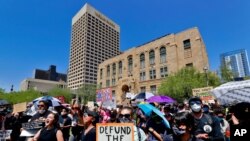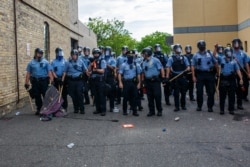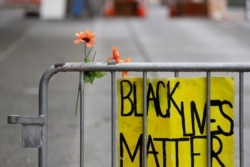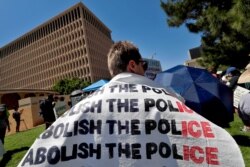Amid continuing U.S. protests over George Floyd's death while in the custody of the Minneapolis police, a contentious new slogan is competing with "Black Lives Matter" and "I Can't Breathe": "Defund the Police."
Long a core demand of activists on the far left, "defunding the police" has entered the national lexicon as protesters press for structural reform to end political brutality and endemic racism in the criminal justice system.
But what does "defunding the police" mean? The answer depends on whom you ask.
While most protesters take it to mean a reallocation of police funding to social services, a smaller group of activists has gone further, calling for the complete defunding and even outright elimination of police departments.
Until recently, the concept of defunding police departments was not a major part of the national debate over criminal justice reform, said Clark Neily, vice president for criminal justice at the Cato Institute, a libertarian think tank.
But while a handful of cities have announced plans to slash their police budgets, Neily said he does not expect the movement to lead to a significant drop in police spending in the country.
For one thing, police and other law enforcement officials constitute one of the most influential lobbies in the country, according to Neily.
“And of course, they will deploy that power to protect their budgets," he said.
Here are six key questions about the “defund the police” movement.
Who coined the phrase?
While most people first heard the phrase only in recent days, anti-police protesters used it in Chicago and New York as far back as 2015 and 2016.
In 2015, a group of protesters in Chicago shut down the annual meeting of the International Association of Chiefs of Police, demanding that “all local, state and federal budgets … defund the police and reinvest in social services like education and public health.”
In 2016, anti-police activists in New York City occupied City Hall Park, demanding that the city “Defund the NYPD and invest in black, brown and working-class communities.”
What does ‘defunding’ actually mean?
For most advocates, defunding the police simply means cutting funding for police departments and redirecting it to services that improve lives and reduce crime. These proponents say cities spend far too much money on policing and not nearly enough on social services for drug addicts and mentally ill people, among others.
In an open letter, the coalition Movement for Black Lives said the funds taken from police departments “could go towards building healthy communities, to the health of our elders and children, to neighborhood infrastructure, to education, to child care, to support a vibrant black future. The possibilities are endless.”
What about police abolition?
Claiming that defunding the police is not enough, some protesters and politicians have urged a more radical measure — the complete abolition and reconstruction of police departments.
Last Saturday, nine members of the Minneapolis City Council caused a stir when they pledged to dismantle the city's police department and replace it with a “new model of public safety.”
Minneapolis Mayor Jacob Frey does not support the measure, and the council has yet to vote on the move. Council President Lisa Bender told CNN on Monday that the body will have to discuss what to replace the police with.
No other U.S. city has gone this far. Some advocates say abolition does not necessarily mean disbandment.
Georgetown University law professor Christy Lopez has argued that abolition means “reducing, with the vision of eliminating, our reliance on policing to secure our public safety.”
How much do U.S. cities spend on policing?
For many U.S. cities, policing is the single most expensive line item in their budgets, according to Neily.
In recent decades, U.S. spending on policing has skyrocketed even as crime has dropped precipitously. In 2017, state and local governments spent $115 billion on policing, up from $42 billion in 1977, according to the Urban Institute.
But although policing accounts for a little less than 4% of total spending, some cities spend far more, and critics say excessive spending for operating and equipping police departments has come at the expense of other services.
The city of Oakland, California, for example, spends nearly $300 million on policing — more than on transportation, human services, and parks and recreation combined.
What cities have proposed cuts in police budgets?
In response to calls to defund the police, several major city mayors have announced plans in recent days to slash the budgets of their police departments.
Mayor Bill de Blasio of New York City, the nation’s largest city, pledged on Sunday to redirect an unspecified amount of the police department’s annual $6 billion budget to social service programs.
Mayor Eric Garcetti of Los Angeles, the country’s second-largest city, last week proposed cutting up to $150 million from the police department’s annual budget of $1.8 billion.
Chicago, the third-largest city, however, has not joined the movement.
What do critics say?
Despite its apparent popularity among protesters, defunding the police does not enjoy widespread public support. A YouGov poll of 1,060 U.S. adults conducted May 29-30 shows that only 16% of people favored the idea. The survey had a margin of error of plus or minus 4.3 percentage points.
There are approximately 18,000 federal, state and local law enforcement agencies in the United States. For many Americans who view police favorably, the thought of abolishing local police departments is unfathomable. Among other things, many worry that it would cause a spike in crime, endangering lives and driving down property values.
Police unions have pushed back against the idea.
In a statement on Monday, the International Association of Chiefs of Police called it a “misguided, shortsighted approach.”
“In an already underfunded profession, resources should not be taken away from the police, but rather, additional resources given to these areas,” IACP said.
President Donald Trump has used the rallying cry for defunding police departments to attack former Vice President Joe Biden and the Democrats — although Biden has come out against the idea.
“LAW & ORDER, NOT DEFUND AND ABOLISH THE POLICE,” Trump tweeted on Monday. “The Radical Left Democrats have gone Crazy!”







